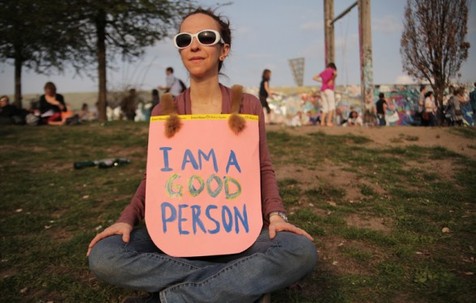|
In teaching youth about sin, I solicit examples. There are typically two answers. First, they respond with the most surface and trivial behaviors. “Not cleaning your room.” “Telling a lie.” “Using a curse word.” Or they respond with the most seriously egregious sins. “Murder.” “Doing drugs.” “Robbing a bank.” I’m realizing that people do this in general – categorize sin as either trivial or egregious. And in doing so, they largely avoid seeing themselves as “sinful.”
In a New York Times editorial titled “The Moral Diet,” David Brooks comments on a new book by Dan Ariely. As a sociologist, Ariely has noted that nearly everybody cheats, but only a little. Brooks says, “That’s because most of us think we are pretty wonderful. We can cheat a little and still keep that ‘good person’ identity.” We have a tendency to rationalize our sin. “It’s not that bad. It was just a little white lie.” By self-justifying our moral failures, we diminish their seriousness. The term “sinner” is reserved for those who do the seriously egregious things like murder and rob. It should only be used with ruthless dictators, terrorists, politicians, and CEO’s of big banks. Brooks says, “People are more likely to believe in their essential goodness.” In other words, “I may not be perfect, but I’m good person.” Or, “I make mistakes, but at least I’m not like him.” It’s interesting that Jesus always made sin “worse.” By expanding the definition of what a sin was, he made it harder, or rather impossible, to be “essentially good.” He made more people adulterers when he declared adultery to be more than just a behavior. Adultery is not just the act but an intention in the “heart (Matt. 5:28). All of a sudden, we’re worse that we thought. “Whoa. Maybe I have committed adultery.” An underestimation of sin is more than a morality issue. A deeper consequence is the formation of an inauthentic person. We are a people diseased, yet in denial about the diagnosis. Stealing a Coke from the staff break room is trivial. But thinking that “I’m a good person” who steals Coke from the staff break room – that’s inauthentic self-deception. It wasn’t “eating fruit” that got Adam and Eve in trouble. It was disobedience to the command of God . . . and then denying it. One of the great freedoms of being a Christian is the ability to tell the truth. I can be completely honest about myself, free from the necessity of rationalizing my “good person” façade. I am able to tell the truth, even about things I don’t want to admit - the deepest, darkest secrets. Yet at the same time, the truth about God is that he takes me even when he knows the truth about me. This allows me to be authentic. As I work within a culture suffering from the “good person epidemic,” I often wonder about the relevance of Jesus. As one who knows his sin is great, I know my Savior is greater. How great is a Savior when there is only trivial sin? What do we do in a society drenched in self-justifying denial? What do I do when someone steals my Coke from the fridge in the staff break room? Comments are closed.
|
JOIN My Tribe
|



